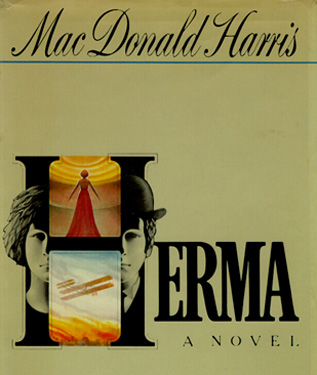Herma
by MacDonald Harris.
New York: Atheneum Publishers, 1981. Also London: Jonathan
Cape, 1983.

From the Jacket:
Here is a delight: MacDonald Harris's colorful, fanciful, and moving
Herma, the story of a willful young woman who conquers the musical world of
the Belle Epoque.
Herma is many things: a glamorous story of a singer who rises from the choir
of a country church to stardom at the Paris Opera: the parallel
advantures of her agent and friendly enemy Fred Hite, filled with
the excitment of the early days of aviation; and a provocative sexual
intrigue whose twinned her and heroine, not brother
and sister, are yet forbidden to each other by the
secret that lies at the center of their odd and intimate relationship. From
its evocative beginnings in the pastoral Southern California of the
turn of the centura, Herma moves on to larger worlds--first the
brash, adolescent San Francisco of the period, then the
international world of opera in Paris at the most luxurious,
opulent, and decadent moment of its history. Erotic, bejeweled,
crowded with incident and a big, vivid cast of
characters, Herma is MacDonald Harris's richest and most complex novel
and destined to be his most popular.
Critical Acclaim for Herma
- "What a delightful jaunt this is through the turn of the
century, touching down on all its grand personages and
preoccupations, from opera and pioneer aviation to Caruso
and Marcel Proust, all in the company of the charming
Herma, whose middle name should be Aphrodite."
Oakley Hall
- "A daredevil trompe-l'oeil coup-de-theatre. A fine
example of fictive truth stronger than fact. The idea
of coupling aviation with high-wire vocalism (correctly perceived and
masterfully portrayed as cognate) invests this big book
with metaphorical glamour. The performance is both assured and
alluring."
James McCourt.
- "This enchanting historical novel, which begins with the crack of
a whip in a Victorian buggy and ends with an apocalyptic dog-fight
in a World War I biplane, is a novel about aviation. It is
also a novel about opera, indeed the most sumptuous one
ever attempted, with full-blown portraits of luminaries such as
Caruso and Puccini as well as detailed
expositions of oepras and vocal techniques...What makes Herma
a significant and delightful breakthrough for Harris is a
new range of technique and feeling...Herma is an exhilarating work,
surely one of the brightest of the season, by a superb craftsman working
at the peak of his form. The shadow of mortalityi
that spreads out at the end lurks implicitly
from the beginning, a necessary counterpoint to the novel's vibrant and
magical affirmation of life."
Jack Sullivan, Washington Post Book World
-
"A talented writer produces his finest novel...Herma is fascinating,
touching, and immensely entertaining. It is Mr. Harris's ninth novel
in 20 years of steadily sharpening skills and it outreaches all
the work that he has done before...It is much superior to
E. L. Doctorow's Ragtime.
Edmund Fuller, The Wall Street Journal.
-
Herma is an original, skillful, and
fascinating novel, set in California and Paris, between about 1885 and 1915.
The writing is witty and allusive, stylish and yet natural. MacDonald
Harris never strains for effect or raises his voice, but his
book is both sensational and revolutionary...The writing is like an
exactly observed fairy tale; it is also funny and exciting and
convincing."
Kendall Mitchell, Chicago Tribune.
-
"This is, by any reckoning, an extraordinary novel, and a delightful
one...A romance of Nabakovian subtlety and
audacity written in language of shining precision...Surely
one of the best novels about opera ever written, with a range of tone
and feeling worth of some masterwork by Verdi,
Herma has another element: magic."
Publisher's Weekly.
- "MacDonald Harris...has been something of a bypassed talent,
having received less attention than he deserves. Mr. Harris is an
elegant and fastidious writer, a thinking man's novelist, with
a penchant for international situations and polyglot dialogue."
James R. Mellow, The New York Times Book Review.
-
"What makes Herma so engrossing...is Harris's style. He has the ability to
evoke the greatest emotion from a few well-placed words that,
like the 19'th century stereoscope, makes
everything three-dimensional when viewed through their lenses."
Laurel Graeber, Village Voice Literary Supplement.
Return to Harris/Heiney publications page

